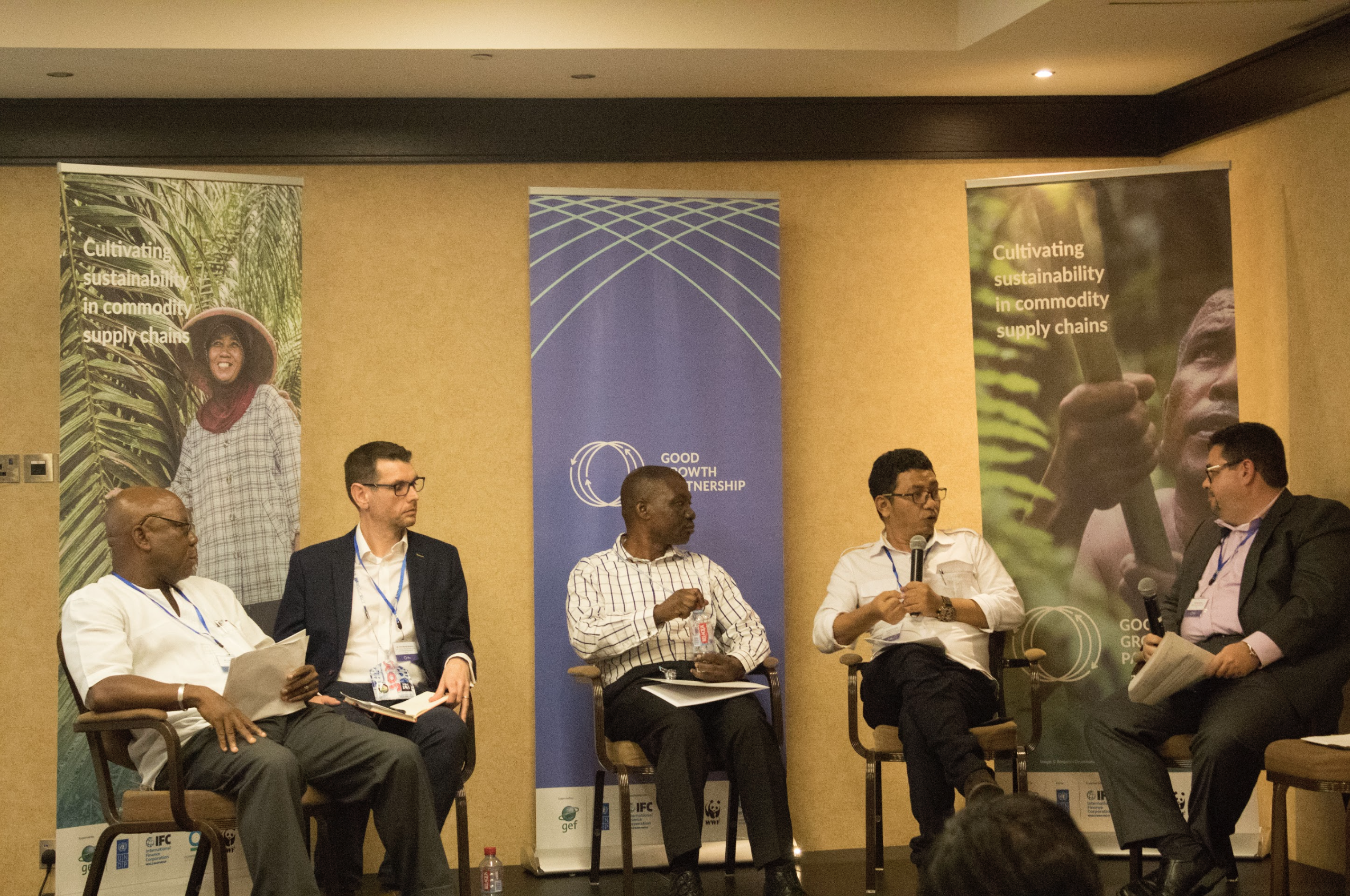Accra, Ghana. This year’s TFA 2020 General Assembly was aptly entitled ‘A Sprint to 2020’ in reference to the Alliance’s looming deadline to achieve zero commodity-driven deforestation. However in the face of continued global deforestation rates and environmental degradation, the general consensus among the delegates was that urgent action is needed now more than ever.
In her keynote address, Naoko Ishii, CEO and Chairperson of the Global Environment Facility (GEF), reiterated this urgency. “We have 30 months to make headway on an agenda where we’re falling behind.”
One-thousand days out from the TFA’s 2020 target, the Good Growth Partnership hosted a discussion on the sidelines of the General Assembly. Panelists, representing a number of commodities and actors from the countries in scope for the initiative, considered how an integrated supply chain approach could accelerate and enable the action needed to finally combat deforestation.
Below are four key takeaways from the May 16 panel discussion.
1. A Supply Chain Approach
In setting the scene for the panel discussion, Pascale Bonzom, Global Project Manager for the Good Growth Partnership, emphasized the importance in taking a supply chain approach to unlock persistent barriers that are preventing the production of sustainable agricultural commodities. Such an approach entails working simultaneously on promoting sustainable production, while enabling responsible transactions and generating demand for sustainable products.
“We won’t have sustainable production if there is no demand for it,” she said in her opening remarks when introducing the GEF funded Commodities integrated approach pilot, now known as the Good Growth Partnership. Similarly, financial services and products need to incentivize both sustainable production and responsible demand.

(From left) Francis Mwah, Assistant Director and Senior Economist at Liberia’s Ministry of Agriculture; Nick Martell-Bundock, Cargill’s Senior Director of Corporate Responsibility and Sustainable Development; Abraham Baffoe, Proforest’s Regional Director for Africa; Mansuetus Darto, National Coordinator of Indonesia’s Palm Oil Smallholders Union; (moderator) Paul Hartman, Sr. Environmental Specialist at the Global Environment Facility.
“We won’t have sustainable production if there is no demand for it,”
Pascale Bonzom, Good Growth Partnership
Nick Martell-Bundock, Cargill’s Senior Director of Corporate Responsibility and Sustainable Development said that incentives and conditions introduced by the finance sector, for example, have the power to drive a ripple effect of responsible production upstream. As an example he noted that in Brazil, access to finance for large-scale soy producers is not an issue, however access to finance that has the ability to incentivize responsible behavior in the country is still considerably limited.
Speaking on this holistic supply chain approach Martell-Bundock, emphasized the layered and multifaceted complexity of deforestation in commodity supply chains. “When you take an issue like deforestation, I think in some cases we have taken simple technical solutions to address it, when actually it’s part of a broader picture.”
2. Government Leadership is Key
“We feel that it’s important to get it right, rather than try to correct mistakes which we see are already happening in the region,” explained Abraham Baffoe, Africa’s Regional Director for Proforest, who highlighted the commitment from the 10 participating nations of the TFA 2020 Africa Palm Oil Initiative.
Government leadership is among the biggest lessons and proven requirements for success when it comes to reducing deforestation explained Baffoe.
“When it comes to palm oil, when you look at the 10 countries in West and Central Africa under the Africa Palm Oil Initiative, one thing we have learned is that when government takes a committed leadership role, the process moves very fast, strong engagement and progress is made. In countries where government commitments or leadership is wavering, progress is very slow.”
3. Community Engagement is Critical
Francis Mwah, Assistant Director and Senior Economist at Liberia’s Ministry of Agriculture, emphasized the importance of genuine community consultation in the development of his country’s oil palm industry. This includes meeting and respecting the needs of local and indigenous groups particularly when livelihoods and food security is at stake.
An estimated 70 percent of Liberians depend on agriculture for their livelihoods and many are not convinced that the economic palm oil boon will benefit them.
“It’s an epic process. We feel that the communities should be involved in every line of production,” said Mr. Mwah whose Ministry recently reignited multistakeholder discussions via the Oil Palm Technical Working Group (OPTWG) with support from the Good Growth Partnership, to find resolutions for land use planning conflict as well as ensuring protection of Liberia’s vast primary forests.
4. Smallholder Mapping and Data Needed to Move Forward
Speaking on behalf of Indonesia’s smallholder oil palm farmers, Mansuetus Darto, National Coordinator of Indonesia’s Palm Oil Smallholders Union, explained that providing an enabling policy and regulatory environment is a necessary condition but would not be enough to foster sustainable production at a district or jurisdictional level.
At the local level he explained that there is no accurate and comprehensive data about oil palm smallholder farmers. Therefore, among the first steps to support their transition to sustainable production is to develop a database to identify them and their location].
In 2015 alone, these smallholder farmers managed up to 40 percent of the total oil palm plantation area in Indonesia, contributing 34 percent of crude palm oil production nation-wide. Their yield, however, is 50 percent lower than that of large-scale commercial companies. (Sourced via the World Resources Institute).
Darto went on to explain that this lack of smallholder mapping and data is a significant barrier to sustainability, not least when it comes to accessing national finance schemes such as the Indonesian Oil Palm Plantation Fund (BPDP-KS), which was established in 2015 partly to assist small-scale farmers to replace their aging oil palm trees with higher-yielding varieties.
By: Rebecca Lake, Good Growth Partnership Communications Advisor
